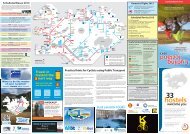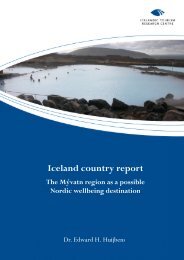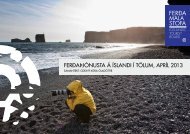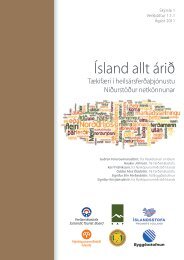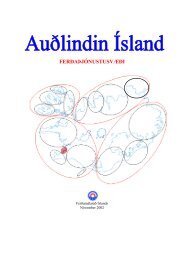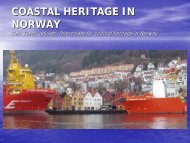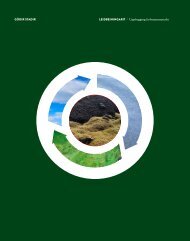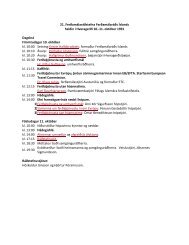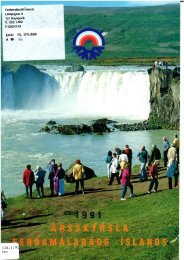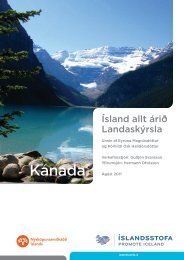Untitled
Untitled
Untitled
You also want an ePaper? Increase the reach of your titles
YUMPU automatically turns print PDFs into web optimized ePapers that Google loves.
domain of knowledge is not always altogether easy, for customer and<br />
researcher alike.<br />
As is well known, and often lamented too, tourism studies and<br />
tourism research is haunted by the divide between applied and academic<br />
research, between expectations and demands from the industry and<br />
independent scientific development of knowledge free from external and<br />
partial interests. Perhaps this divide is more evident in tourism studies than<br />
many other social science disciplines. Yet, a common core assumption in<br />
social research philosophy is that any and every knowledge of the social<br />
produced by social science is itself already fundamentally and inevitably a<br />
part of the social world.<br />
This means, in principle, that the social scientist has no access to a<br />
separate place from where the social world can be observed without<br />
involvement. The issue at stake is then not whether the tourism researcher<br />
is objective or subjective, in the hands of the “business” or in the head of<br />
the academics, but instead about in what ways and from what perspective<br />
the researcher is participating. In as much as the focus is on tourism itself,<br />
then it also becomes actualized. One could then argue that it is not unusual<br />
that tourism research is done under the spell of de nobis ipsis silemus (“on<br />
ourselves we are silent”) (Farinelli 2009).<br />
According to Shaw and Williams, “[o]ne of the greatest challenges<br />
for researchers is to understand how it [tourism] shapes and is shaped by<br />
wider societal processes” (Shaw and Williams 2004, p. 3). Yet, as easy as<br />
it is to agree that understanding of tourism could benefit from aligning it<br />
with “societal processes”, one could still put question marks around the<br />
social in tourism theory. What we particularly have in mind is the recent<br />
interest in exploring various materialities in the social sciences, which<br />
includes a recognition of the role of non-humans and their material<br />
agencies in the constitution of what traditionally has been conceived of as<br />
social. This “material turn” problematizes attempts in tourism studies to<br />
understand and explain tourism and tourists primarily as social<br />
phenomena. Given that human tourism mobility is co-produced with<br />
material, objects, goods, artefacts, and other non-humans, tourism is only<br />
partly social. Indeed, as Franklin puts it:<br />
Tourism abounds with things, tourist things, and tourists are tied up in a<br />
world of tourist things for a considerable period of their time. And. yet,<br />
if you read all the past and current text books on tourism, and make a list<br />
of all the really important explanations of tourism, the key concepts and<br />
theoretical developments, you will discover that these things are not held<br />
to be very significant (Franklin 2003, p. 97).<br />
57



